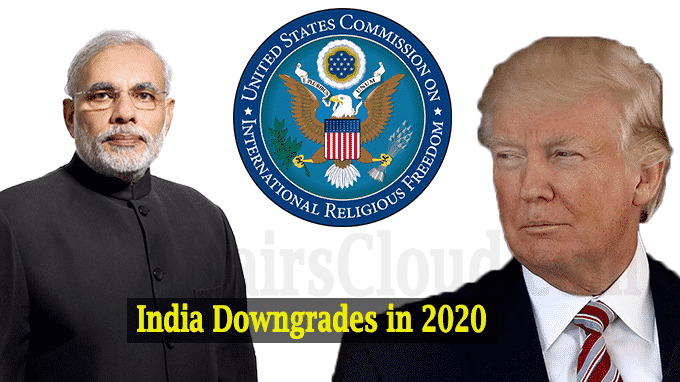The U.S. Commission on International Religious Freedom (USCIRF) in its Annual Report 2020 has downgraded the Indian ranking by naming it into the list of “Country of Particular Concern (CPC)”i.e. Tier 1 from“Special Watch List i.e.“Tier-2” in 2019 report. This is the first time since 2004 that India has been placed in this category for engaging in and tolerating systematic, and ongoing religious freedom violations, as defined by the International Religious Freedom Act (IRFA), 1998.
- The report which documented significant religious developments during 2019 has placed 14 countries under CPC viz. Burma, China, Eritrea, India, Iran, Nigeria, North Korea, Pakistan, Russia, Saudi Arabia, Syria, Tajikistan, Turkmenistan, and Vietnam.
Activities in India resulting decline in India’s rank, as per report
As per the report, the Indian government is formulating policies that violate religious freedom across the nation, especially for Muslims which are as follows:
- Citizenship (Amendment) Act and the National Register of Citizens: It provides a fast track to Indian citizenship for non-Muslim migrants from Afghanistan, Bangladesh, and Pakistan already residing in India, which means, the law does not include Muslims in nationwide National Register of Citizens (NRC) resulting in their detention, deportation, and potential statelessness.
- Cow Slaughter Laws– Article 48 of India’s constitution directs the state to “take steps prohibiting the slaughter of cows and calves”.In this regard,21 states criminalize cow slaughter in various forms under which minorities including Muslims, Christians, and Dalits were attacked under suspicion of eating beef, slaughtering cows, or transporting cattle for slaughter. Cow protection is a key issue promoted by the Bharatiya Janata Party (BJP) and the Rashtriya Swayam Sevak Sangh (RSS).
- Anti-Conversion Laws– 10 Indian states have anti-conversion laws criminalizing proselytization (converting someone’s religion)using force, allurement, inducement, or fraud. In 2019, BJP ruled Himachal Pradesh increased the penalties for forced conversions but arrested Muslims and Christians for conversion activities.
- Religious Freedom in Jammu and Kashmir– In August 2019, the Muslim autonomy of Jammu and Kashmir imposed with security measures, including restricting freedom of movement and assembly, cutting Internet and phone access, and arresting Kashmiri leaders, including religious leaders. The restrictions on movement and assembly limited the ability to attend prayers and religious ceremonies.
Recommendations by USCIRF against India to US State Department
-The commission recommended that the United States (US) government take stringent action against India under the IRFA, 1998.
-It also recommended imposing targeted sanctions on Indian government agencies and officials responsible for severe violations of religious freedom by freezing their assets and/ or barring their entry into the US.
India-US Relations
Though India-US relations saw positive developments in 2019 like strengthening of
Security and defence sector but at the same time, U.S. officials also highlighted concerns with India’s religious freedom violations through public statements, congressional hearings, and bilateral engagements. However, the Indian government rejected the US State Department’s and USCIRF’s reporting on religious freedom violations in India.
Click Here for Official Report
About USCIRF:
Created by IRFA, USCIRF is an independent U.S. government advisory body, separate from the State Department that monitors religious freedom abroad and makes policy recommendations to the president, secretary of state, and Congress.
Headquarters– Washington, D.C., United States
Chair– Tony Perkins
About IRFA, 1998
Enacted in 1998 by the US Congress, it promotes religious freedom as a foreign policy of the United States.




